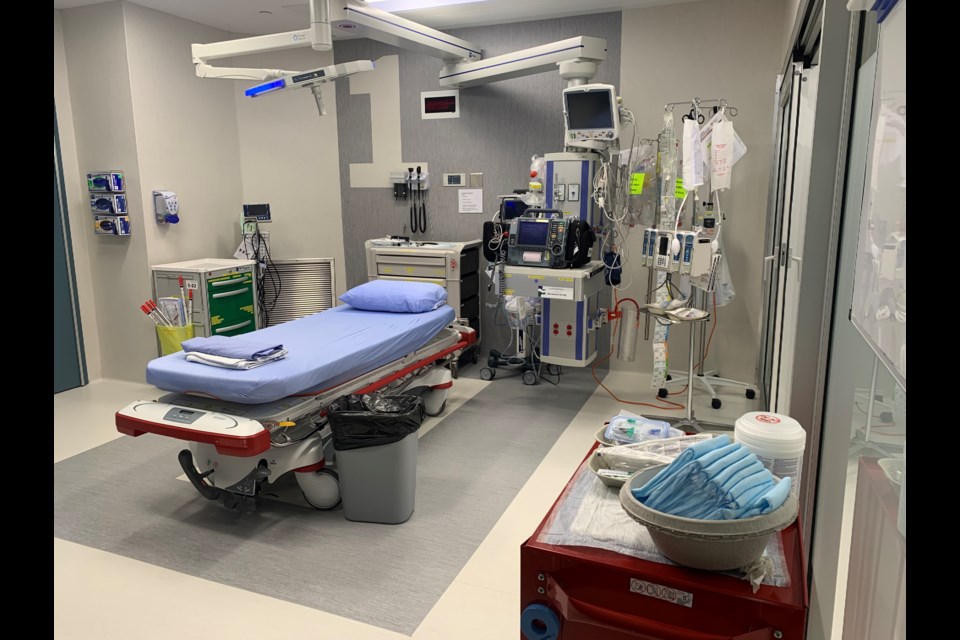After years of fundraising and months of renovations, Whistler’s new trauma unit has finally opened its doors.
The $1.5 million in upgrades were 100 per cent funded by the Whistler Health Care Foundation (WHCF), courtesy of the single largest fundraising campaign in the foundation’s history. A small group of stakeholders gathered at the Whistler Health Care Centre (WHCC) to tour the new space and mark its official opening on Wednesday morning, Feb. 23, four years after local doctors first came to the WHCF to ask for help.
“We have to do some really hard stuff here, and to be able to have everything optimized for when we do get put in really difficult positions makes our lives better so that we can serve our community and our visitors,” explained emergency physician Dr. Fern von der Porten, praising the WHCF’s “the-sky's-the-limit attitude.”
The goals of the highly-anticipated renovation were to create more usable space, improve the area’s functionality and update the electrical and mechanical gas systems necessary to providing the life-saving care patients need. Walls were knocked out to transform the area into two larger trauma rooms, as well as a small anteroom where medical staff can store supplies and don protective gear before meeting their patient.
The bright, open space features folding glass walls that can be moved aside to create one bigger trauma room, if need be, and allows for air pressure to be negative or positive—“a function essential for infection prevention and control,” according to Vancouver Coastal Health (VCH). It also includes UV lighting that automatically turns on after five minutes if no movement is detected, which helps disinfect surfaces in the space, as well as an isolette to treat the occasional baby unexpectedly born at WHCC.
Arguably the most game-changing additions to the space are the state-of-the-art booms that now hang over the treatment areas, centralizing important surgical equipment and utility services rather than having countless machines and cords running across the floors.
“The walls are not bigger, but the space is much bigger and the ability to take stuff off the walls and hang them from these booms makes it so that we can walk the whole way around the patient,” said von der Porten.
The renovations were critical for the small WHCC. Previously, the main trauma room measured in at just 18 square metres (less than 200 sq. ft.). Since the WHCC opened in 1994, the space had outgrown the community’s needs—particularly since the former trauma unit was constructed pre-Whistler Mountain Bike Park, which in itself is responsible for many of the most serious injuries that come through WHCC’s doors each summer.
Despite its classification as a rural clinic, the WHCC is the first stop for many whose on-mountain pursuits have resulted in severe injuries. The facility provides care for more than 22,000 patients and clients each year, with approximately 1,500 people needing critical care. Staff handled 41 recitations in 2018. Some days up to 140 patients come to the facility in varying degrees of need.
“It’s not just the volume of cases that is notable,” explained von der Porten in a WHCF video created early on in the Foundation’s fundraising campaign. “In the last 10 years, the seriousness and complexity of cases has pushed patient care to a level not seen at most small, rural medical facilities. Whistler might just be a diagnostic and treatment centre, but it functions as a high-level emergency and trauma department.”
Renovations began last spring, after the WHCF reached its monetary goal for the project in January 2021.
The WHCF’s campaign began with significant donations from the Sea to Sky Hospital District and the Whistler Blackcomb Foundation, ($500,000 and $300,000, respectively), while major contributions from GFL Environmental ($300,000), the Rockowitz Family ($100,000), the Squamish Hospital Foundation ($100,000), the Katz-Amsterdam Foundation ($90,000) and other donors rounded it out.
Vancouver Coastal Health came on board in November 2019 once the fundraising campaign passed the seven-figure mark.
The WHCC is “one of our gems,” noted Sean Parr, interim vice president of VCH’s coastal region, during the unit’s official opening. “It’s about time we got a top-quality, world-class trauma centre to reflect the services that are provided here, which are incredible.”
With the project now complete, the WHCF is looking ahead to its next endeavour. Event organizers are inviting potential sponsors to contribute to the inaugural “Hike for Health” fundraiser, scheduled for Sunday, June 19. The upcoming fundraiser aims to drum up money for general medical equipment upgrades at the WHCC.
The first annual Hike for Health event will take place on Blackcomb Mountain’s Ascent Trails, the three interconnected paths trails that meander uphill from Whistler’s valley bottom to the Rendezvous Lodge.
Participants can embark on one of three hikes: the single-kilometre Little Burn, the 3-km Big Burn, or the full 6-km Heart Burn that brings hikers to the top of Blackcomb Mountain. (Anyone unable to participate in the hike is also invited to hop on the gondola to enjoy the post-hike festivities.)
There are currently three sponsorship tiers available, with the highest level offering event naming rights.
Prospective donors can contact organizers Lindsay Burch at [email protected] or Michelle Gemmill at [email protected].






